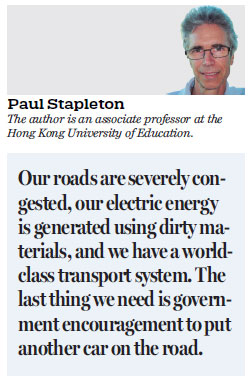Eliminating luxury-EV tax break makes sense
Updated: 2017-12-21 06:14
(HK Edition)
|
|||||||
Recent news that electric-vehicle sales in Hong Kong have fallen off a cliff comes on the heels of the tax discount for purchases of new EVs being scrapped. Our government has taken a lot of heat for the new policy from green groups and prospective EV buyers but in fact, ironically enough, making EV buyers pay their fair share of tax is the correct policy, even from an environmental point of view.
Until earlier this year, EV buyers had a hefty tax reduction that in some cases cut the normal cost of an EV almost in half. Since the discount was eliminated, however, sales have dropped 97 percent from a year earlier. These days, walking into an EV dealership is like entering a nunnery at midnight.
In the meantime, countries in Europe are making vows to completely eliminate petrol and diesel cars in a couple of decades in order to clean up their air. The Chinese mainland has also announced a similar goal. It is possible that in a quarter century from now, in many parts of the world, the only cars on the road will be EVs. Why then, is our government making it more difficult to purchase EVs? Isn't the tax discount on EVs good for the environment?

The answer to these questions requires a bit of counterintuitive thinking. First of all, unlike in overseas markets, virtually all EVs in Hong Kong are large luxury cars - in other words 2 tons of expensive steel, aluminum and leather. To manufacture such a large vehicle, almost 10 tons of carbon are emitted into the atmosphere, which, in terms of carbon footprint, is equivalent to about two years' worth of carbon, based on the average Hong Kong resident's energy use. This is because about 90 percent of local residents are carless; instead of lugging themselves around town in a 2-ton vehicle, electric or otherwise, they use the MTR and buses, which have a per capita carbon footprint that is much lower than a private vehicle's.
So although EVs are often referred to as green vehicles, this is far from the truth because the label ignores the very real environmental cost of manufacturing the vehicle. And this fiction about EVs is especially far from the truth in Hong Kong where the public transport system is among the best in the world. Basically, for the vast majority of the population, there is absolutely no need to own a vehicle, electric or otherwise.
And while it is true that EVs do not contribute to roadside air pollution, their mere existence on the road contributes to congestion that lengthens the commuting time of the real eco-troopers who stand on buses.
Let's also be realistic about the power source EVs use. In Hong Kong, filthy coal is burned to generate nearly half our electricity. The rest is a mix of natural gas and nuclear power. This means when EV owners power up their luxury vehicles at a charging station, (which, by the way, is provided free of charge) they simply shift pollutants further from the city. While this is good it certainly isn't green because all carbon emissions contribute to climate change. Somehow owners of these vehicles believe that just because nothing comes out of the tailpipe, their EVs are environmentally responsible.
In other countries such as Denmark, where distances are much longer and renewable energy such as wind and solar makes up a large part of the fuel mix for generating electricity, EVs make perfect sense. Once you own an EV, your movements are mostly carbon free. However, this is not at all the case in Hong Kong. Here, distances are short and electric power is exclusively generated by burning fossil fuels and splitting the atom, both of which create dangerous waste products.
Now let's return to the government's decision to remove the tax discount on new EVs. In a perfect world, the decision would not make sense. But our world here in Hong Kong is not perfect. Our roads are severely congested, our electric energy is generated using dirty materials, and we have a world-class transport system. The last thing we need is government encouragement to put another car on the road.
(HK Edition 12/21/2017 page11)